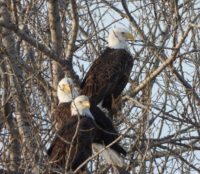A Modern Ark

 Not many years ago I complained to my dad about how hard it was to keep the deer from eating my fruit trees, vegetables, and flowers; he told me whitetail deer, as well as pigeons and geese, were nearly extinct in the first half of the 20th Century. It’s hard to imagine now, but he rarely saw a deer when he was a kid.
Not many years ago I complained to my dad about how hard it was to keep the deer from eating my fruit trees, vegetables, and flowers; he told me whitetail deer, as well as pigeons and geese, were nearly extinct in the first half of the 20th Century. It’s hard to imagine now, but he rarely saw a deer when he was a kid.
They’re so thick around here now; their criss-crossing paths in the field and woods are becoming furrows from constant use. Though it’d be easier to grow my garden without them, it would be sad never to see their white tails flashing in the woods or fawns playing near their mamas in the spring.
Dad rarely saw deer as a kid, and I grew up missing eagles. We’re lucky to see the return of both species, but I wonder what my children and grandchildren will miss. Scientists say we’ll lose half of all species currently on Earth by the turn of the next century. It’s hard to feel hopeful in the face of such loss.
But people like Joel Sartore are staying hopeful and doing what they can. He’s working to inspire people to save endangered animals and their habitat. Deer and eagles returning prove it’s possible. Traveling the world, he’s creating an animal photo ark, which I happened to see on the CBS Sunday Morning show.
His photos are beautiful; watching him and the team work with the animals to capture them fascinating. While big predators, furry and cute critters are the usual “poster animals,” (think polar bears, tigers and monkeys), Sartore documents all endangered animals, tiny, large, reptile, mammal, or insect.
 In fact, you can find the Iowa Pleistocene Snail on his website. The loss of a snail species in Iowa may not seem a crisis, but we are, as a planet, in a crisis of species loss. Scientists project the world will lose a million species in the next few decades.
In fact, you can find the Iowa Pleistocene Snail on his website. The loss of a snail species in Iowa may not seem a crisis, but we are, as a planet, in a crisis of species loss. Scientists project the world will lose a million species in the next few decades.
Considering what this means for the planet, the species, and for us as humans, you’d think we’d respond as to a five-alarm fire. But for the most part, we move on as if nothing is wrong. We tend to apathy, with moments of horror at what’s happening. Why apathy?
Apathy may keep us from feeling the overwhelming grief of so great a loss. We think we have no way to deal with the situation, and it’s hard to feel at all hopeful with the scale of the loss we’re facing. Without some shred of hope, we are paralyzed to act or even feel.
Stephen Jenkinson and Persephone Pearl believe we’ve lost our way in dealing with our own death, much less the death of species. This article suggests, “We struggle to talk about death and dying,” Pearl said. “It is seen as a terrible thing, to be avoided at all costs.”
These are such big questions, and the answers don’t come easy. I wonder what our kids and grandkids might rescue from the brink of extinction. I’m glad Mr. Sartore and other artists are trying their best to inspire us to pay attention and take action. What will you do?


